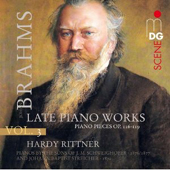
ESSENTIAL RECORDINGS

Music from his autumn years, when Johannes Brahms no longer had to prove anything to anyone, when he could let his guard down, and simply
let his inner soul dictate the music's direction regardless of form or structure. The twenty concise pieces that constitute the Fantasien Op. 116, Drei
Intermezzi Op. 117, Klavierstücke Op. 118 and Klavierstücke Op. 119, are all infused with a serenity that can only
manifest itself from a deep confidence in one's own knowledge. By this time, Brahms had mastered his art and most of all, had completely obliterated Beethoven's
shadow with his own creative light. These late works show Brahms exploring new harmonic progressions, new motivic combinations and improvisations, and a new
dissolution of rhythm at times. And like autumn itself, they reveal all the deep and vibrant colors that were once concealed beneath the outer surface of youth.
Pianist Hardy Rittner, whose mentorship includes luminaries like Pogorelich, Zimerman, Pires and Gavrilov, has once again chosen, as in his
previous Brahms recordings, to perform this music on period instruments, and for good reason. As he himself explains in the booklet notes, instruments from the end
of the 19th century did not exhibit the same homogenous sound as today's concert grands do. They each possessed a distinctive sound and character, to the benefit
or detriment of particular piano pieces. Except for the sorrowful first Intermezzo, I find the op. 116 pieces to be sunnier in nature and more incisive, and accordingly,
the J. M. Schweighofer's Sohne Piano from 1876, with its brighter edge and wider dynamic range, is the perfect instrument for them. On the other hand, the darker and
softer edged J. B. Streicher and Sohn Grand of 1870, is clearly best suited for the op. 117, 118 and 119 pieces which exploit the darker keys and minor modes, and all
in all reside within the more pensive regions of the mind.
Another advantageous benefit of this new MDG release, is the fact that all the late opus numbers are gathered together on one disc and can therefore
be enjoyed as one session, in one sitting, as they should be. Collectively, they seem to form one singular larger opus anyway. The sound recording itself, as usual with
this label, is devoid of any artificial manipulation, and therefore presents a true reproduction of these fine, historically important instruments. Brahms served straight up!
Jean-Yves Duperron - July 2011